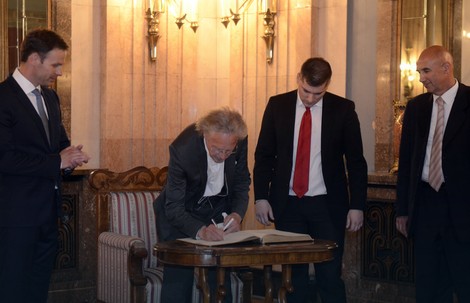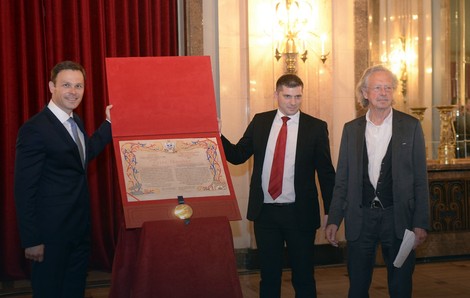https://www.jungewelt.de/artikel/352052.bomben-nachdrucken.html
Bomben nachdrucken
Von Arnold Schölzel
jW
Das Belgrader RTS-Gebäude wurde am 23. April 1999 von der NATO bombardiert, wobei 16 Mitarbeiter den Tod fanden. Für das Kriegsverbrechen (Amnesty International) wurde aber kein NATO-Kommandeur, sondern allein der damalige RTS-Chef Dragoljub Milanovic 2002 verurteilt. Er saß zehn Jahre im Gefängnis. Peter Handke hat 2011 die ungeheuerliche Geschichte in einem Buch erzählt. Aber für »Berichterstattung« vom Balkan reicht auch 2019 Gewisper. Martens beweist, dass man Bomben sogar nachdrucken kann.
Dann aber scherte der Auslandssender Deutsche Welle (DW) aus den Reihen der Unisonomedien aus. Er veröffentlichte am 22. März auf seiner serbischsprachige Website eine Presseschau unter dem Titel »Wie die Bomben gedruckt wurden«. Zitiert wurden Texte deutscher Journalisten aus dem Jahr 1999, deren Namen zudem auch noch genannt wurden – von Matthias Rüb (FAZ) bis Josef Joffe (damals Süddeutsche Zeitung). Die FAZ, die nach eigenem Eingeständnis beträchtlichen Einfluss auf die gewaltsame Auflösung Jugoslawiens in den 1990er Jahren und die Politik der Kohl-Regierung hatte, prangerte das schlechte Benehmen am folgenden Tag an. Südosteuropa- und Türkei-Korrespondent Michael Martens kritisierte die DW-Presseschau in der gedruckten FAZ unter dem Titel »Serbiens Präsident mag das. Deutsche Welle greift deutsche Korrespondenten«. In der Internetausgabe faz.netlautete die Schlagzeile: »Wie man einen Krieg umschreibt«. Untertitel: »Das serbische Programm der Deutschen Welle erinnert an den Beginn des Kosovo-Krieges vor zwanzig Jahren. Wie? Indem es Korrespondenten deutscher Zeitungen Kriegslüsternheit unterstellt.« Martens zitiert folgende Passage aus dem DW-Text: »Vor 20 Jahren zogen die Deutschen in den ersten Krieg seit Hitler – in die Bombardierung Jugoslawiens. Begleitet wurden sie dort(hin) von kriegslüsternen Zeitungskommentatoren.«
Martens und der FAZ scheint das ohnehin zweitrangig. Wichtiger ist: Der Deutschland-Korrespondent des »serbischen Staatssenders RTS« habe die »großartige journalistische Arbeit« der DW »jedenfalls prompt gelobt«. Martens: »Das ist freilich kein Wunder, wenn man weiß, dass RTS ganz auf der Linie des serbischen Präsidenten Aleksandar Vucic liegt, der 1999 Milosevics ›Informationsminister‹ war.« Geraune statt Fakten. Kein Wunder freilich, dass der FAZ-Mann gleich völlig weglässt, was in dem Kontext nicht ganz unwesentlich ist: Das Belgrader RTS-Gebäude wurde am 23. April 1999 von der NATO bombardiert, wobei 16 Mitarbeiter den Tod fanden. Für das Kriegsverbrechen (Amnesty International) wurde aber kein NATO-Kommandeur, sondern allein der damalige RTS-Chef Dragoljub Milanovic 2002 verurteilt. Er saß zehn Jahre im Gefängnis. Peter Handke hat 2011 die ungeheuerliche Geschichte in einem Buch erzählt. Aber für »Berichterstattung« vom Balkan reicht auch 2019 Gewisper. Martens beweist, dass man Bomben sogar nachdrucken kann.Am Montag reagierte die DW, als hätte die »Hauptverwaltung ewige Wahrheiten« eingegriffen. Unter der Überschrift »Entschuldigung: Unjournalistische Presseschau« veröffentlichte sie den von Martens kritisierten Text auf deutsch und behauptete, der Presseschau-Autor habe »nicht die journalistischen Kriterien der DW beachtet«. Der Sender versah den Text mit zahlreichen nicht näher begründeten Bewertungen wie »unangemessen« oder »unzulässig« und änderte ihn, ohne das im einzelnen zu vermerken. Fälschung wird dem Autor nicht vorgeworfen. Noch bemerkenswerter: Die von Martens zitierte Aufregervokabel »ratoborne«, die er mit »kriegslüstern« übersetzte, wird von DW nun mit »streitbar« übertragen.
or 20 Jahren begann der NATO-Krieg gegen Jugoslawien. Vorbereitet wurde er mit Propaganda einer besonders perfiden Art
Gerd SchumannPropaganda ist vorgetäuschte, inexistente Wirklichkeit. Sie wird meist nur kurzzeitig zur Wahrheit erklärt, kann sich als solche aber auch längerfristig etablieren, pseudohistorisch sozusagen – wie im Fall des Jugoslawien-Kriegs, der vor 20 Jahren vom Zaun gebrochen wurde. Die Namen der Anstifter sind bekannt, doch wurde niemals je, zumindest nicht von offizieller Seite, auch nur in Erwägung gezogen, sie vor ein Tribunal zu stellen. Das haben die Täter schließlich selbst eingerichtet.
Also verbreiten William Clinton, Anthony Blair, Gerhard Schröder, Joseph Fischer, Rudolf Scharping bei Gelegenheit immer noch ihre Version von Geschichte als Propagandisten der letzten großen militärisch ausgetragenen Schlacht im Ost-West-Konflikt, jener zur Zerschlagung des Vielvölkerstaates der Südslawen. Sie dient seitdem als Blaupause für alle neuen völkerrechtswidrigen Kriege, die unter dem Vorzeichen der imperialistischen Globalisierung mittlerweile zur Gewohnheit geworden sind. Als Fortsetzung der Ökonomie mit militärischen Mitteln sollen sie allüberall koloniale Abhängigkeit reetablieren.
Die NATO-Angriffe auf Belgrad hätten »die Voraussetzungen für rasche Privatisierungen« geschaffen, so die Autorin Naomi Klein – »ein Ziel, das schon vor dem Krieg feststand«. Der Sieger bekommt alles, und Jugoslawien störte den großen Plan, lebte noch in der Vergangenheit der drei Welten. Die Gegenwart befördert das Land hinab in Welt zwei, gemaßregelt und zerstückelt. …
Der komplette Beitrag erscheint in der Melodie & Rhythmus 2/2019, erhältlich ab dem 22. März 2019 am Kiosk, im Bahnhofsbuchhandel oder im Abonnement. Die Ausgabe können Sie auch im M&R-Shop bestellen.







